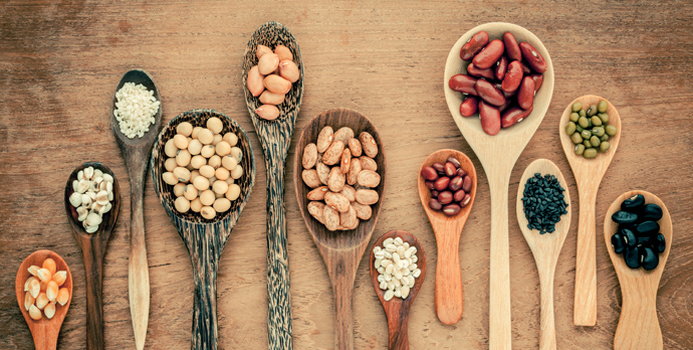Beans are such a nutrient-powerhouse that health experts recommend that you eat at least three cups of legumes (beans, lentils, peas) a week. The incredibly healthy little morsels of nutrition are delicious, easy to prepare, and spectacularly affordable. Let us take a look at just why beans are nature’s perfect food.
Heart Healers
Beans are rich in soluble fiber, which can help lower your triglycerides and cholesterol. Beans contain soluble fiber, which sticks to cholesterol in your gastrointestinal tract, thus preventing it from being absorbed in your blood. In addition to the heart-helping benefits of the fiber, beans also are good food sources of magnesium and potassium — essential minerals that help regulate blood pressure. Be sure to rinse canned beans in a colander to remove about 40 percent of the sodium that is used as a preservative, or purchase no salt added varieties.
Help with Weight Control
Research consistently shows that people who regularly consume beans weigh less than their bean-banishing counterparts. Beans give you protein, but unlike many animal sources of protein, they are very low in fat. Additionally, they have fiber, and since fiber makes you feel full but doesn’t get broken down and isn’t absorbed into your bloodstream, where it would have to be burned or stored as fat, they are excellent for weight management. Beans have been associated with a lower body mass index (BMI) and a lower waist circumference, likely due to their fiber and protein content, as well as their ability to help regulate appetite hormones.
Full of Filling Fiber
Fiber helps fill you up faster and keeps you full longer, meaning you won’t feel the need to eat as much throughout the day. The Institute of Medicine (IOM) recommends that women get at least 25 grams of fiber a day and men get at least 38 grams of fiber per day — minimum. However, most people fall well short of that recommendation with the average daily fiber intake coming in around 15 grams a day. High-fiber foods are larger in volume and take more time to both chew and digest, allowing your stomach time to send signals to your brain that you are full, which could lead to consuming fewer calories.
All beans contain ample amounts of fiber, but navy beans rack up the most fiber with 10 grams in a 1/2-cup serving. Per 1/2-cup serving, cranberry beans come in second place with 9 grams, followed by pinto, dark red kidney, and black beans, all containing 8 grams.
Incredibly Affordable
Beans are the cheapest form of protein available, even cheaper than peanut butter! According to the United States Department of Agriculture (USDA), one pound of beans costs a mere $1.07 on average, while a pound of beef costs $5.28.
Packed with Protein
Beans, a good source of plant-rooted protein, are 21-25 percent protein by weight, which is significantly higher than most other plant sources of protein. A half-cup serving of beans contains 6-9 grams of protein, depending on type. Be sure to eat beans with vitamin C-rich foods, such as bell peppers, citrus fruits, broccoli, or Brussels sprouts.
Very Versatile
Beans can be used in easy snacks (roasted chickpeas), tasty appetizers (hummus), delicious side dishes (bean and veggie salad), or a mouth-watering main dish (bean and veggie soup or chili). Since beans are very mild-tasting on their own, their versatility is through the roof. Beans take on the flavor of whatever spices, herbs, and other seasonings you pair them with.
Cut Cancer Risk
Because of their abundance of antioxidants and phytochemicals, beans have been shown to help lower your risk of cancer, particularly colorectal cancer, breast cancer, and prostate cancer.
Help Regulate Blood Sugar
Due to their unique combination of protein, complex carbohydrates, and fiber, beans are digested slowly over a longer period of time and help prevent blood sugar spikes that can leave you drained and irritable. In fact, research published in the Archives of Internal Medicine revealed that people who had type 2 diabetes sustained lower average blood glucose levels as well as lower blood pressure readings when they ate a half-cup serving of beans each day for three weeks compared to before adding beans to their diets.
Provide an Energy Boost
Beans are high in iron, and iron deficiency is the most common type of nutrient deficiency in the U.S. and can lead to anemia. Anemia causes extreme fatigue; help avoid this by including beans in your diet as often as possible. To increase the absorption of the iron in beans, pair them with foods high in vitamin C. Beans also provide a host of B-vitamins, which help you transform food into energy.
Convenient
Regardless of what form of beans you use (dry, canned, frozen, ground bean “flour”), they are especially convenient to buy, store, and cook. They are shelf-stable, and canned beans require no prep work aside from using a can opener. They can be eaten cold, such as on top of a salad, or thrown quickly into a soup or stir-fry.
Worried about Gas?
We have all the heard the rhyme about beans being the musical fruit, but the more beans you eat, the less likely you are to experience gas and bloating. The key is to slowly add more beans to your diet and increase your water intake. It may take some time for your body to adjust to a higher bean intake, but once they become a consistent part of your healthy diet, you will not have to worry about those unpleasant side effects of the mighty, formerly-musical bean.
[Image via Shutterstock]



